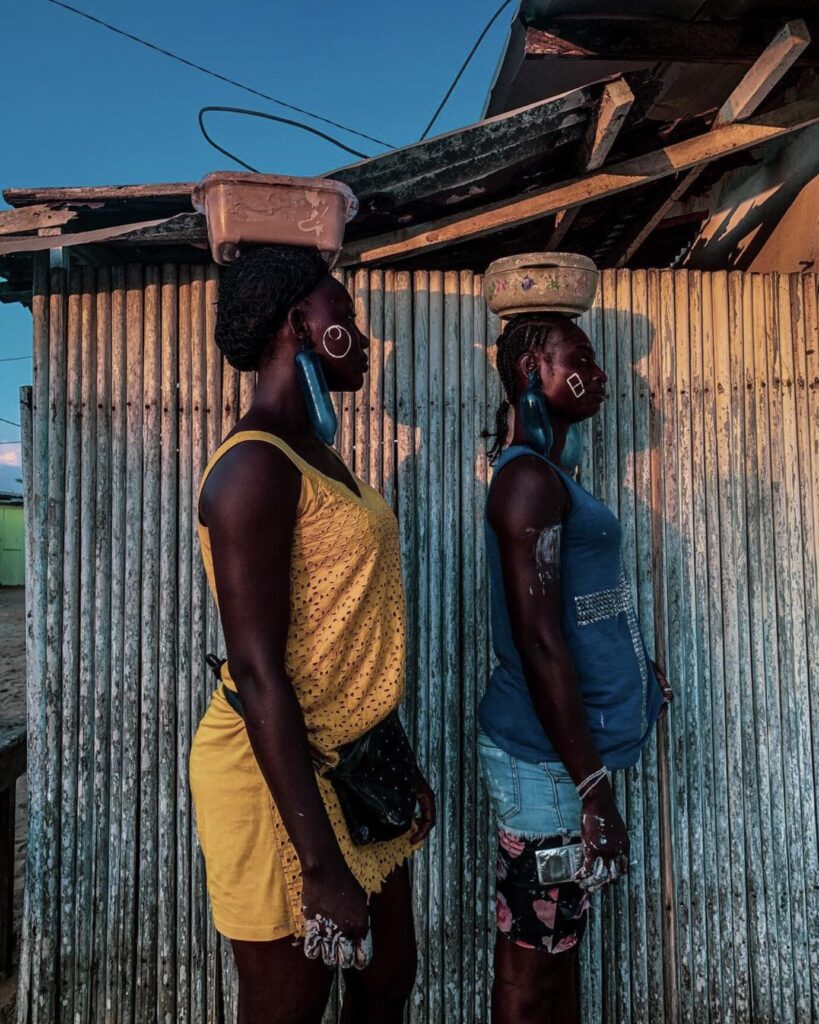

Noella Elloh, a Côte d’Ivoire-based visual artist and photographer. She uses her work to draw attention to one of the most pressing issues of our time—environmental degradation. Her 2019 photo series, Weaving Generations, confronts the devastation of Côte d’Ivoire’s ecosystems, focusing on Blockosso, a traditional fishing village in the heart of Abidjan. Through a poetic interplay of color, shadow, and light, Elloh documents the daily lives of Blockosso’s fishing families as they grapple with the reality of a rapidly changing environment.
Elloh, who obtained her master’s in environmental communication at the University of Quebec at Montreal, returned to her homeland with a powerful mission: to use her art to tell the often-unheard stories of communities like Blockosso. Weaving Generations is not just a collection of images; it’s a profound statement on collective responsibility. Elloh calls on viewers to recognize that environmental threats are not abstract, distant issues, but immediate crises that endanger the livelihoods of real people across Africa.
The imagery in Weaving Generations captures intimate scenes of family life, the rituals of fishing, and the resilience of a community rooted in tradition. Through her lens, Elloh reveals how urbanization and pollution have compromised the health of coastal waters and depleted fish populations, the mainstay of Blockosso’s economy. She highlights that these transformations are not just ecological but deeply personal, disrupting familial ties and cultural continuity.
Urbanization brings prosperity to cities like Abidjan, but it also introduces hazardous pollutants into local ecosystems, often at the expense of marginalized communities. For Blockosso’s fishermen, environmental degradation means not only fewer fish in the nets but also an existential threat to their way of life.
In her art, Elloh employs what she describes as “visual poetry,” a technique that blends documentary photography with fine art elements. This approach enables her to create a rich tapestry of emotions—pride, sorrow, resilience—capturing both the beauty and the fragility of the fishermen’s lives. By playing with light and shadow, she evokes the warmth of familial bonds and the ominous shadow cast by environmental neglect.
Through Weaving Generations, Elloh immerses viewers in Blockosso’s world, offering them a visceral sense of what it means to live on the frontlines of climate change. Her work educates and awakens empathy, urging audiences to consider their role in the environmental story of Africa.
Elloh’s journey from environmental communication to visual storytelling underscores her belief in the power of images to provoke change. Since returning to Abidjan, she has committed herself to telling the stories of communities threatened by environmental degradation. Her images celebrate identity, heritage, and resilience while serving as a stark reminder of what could be lost if environmental issues continue unaddressed.
Weaving Generations is not just an artistic exploration; it’s a rallying cry for sustainable development in Côte d’Ivoire and beyond. Noella Elloh’s work reminds us that every act of preservation or neglect weaves itself into the generational fabric of communities like Blockosso. By highlighting the environmental threat to this historic fishing village, she calls for collective action to protect not just a way of life, but the essential ecosystems upon which so many depend.
Through her artistic advocacy, Noella Elloh is helping to forge a path forward, one where art and activism are interwoven to inspire an accountable and sustainable future.

